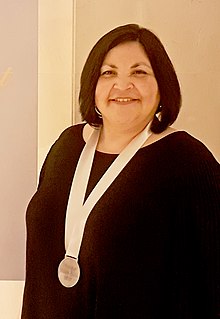A Quote by Otto Penzler
One of the hopes we have when we hear or read an interview with a mystery writer is to get inside the writer's head, to learn something we didn't know before.
Related Quotes
When I look at Perfidia, I think, "That's a Pulitzer Prize winner. That's a National Book Award winner." It's not going to get it. It's going to be shelved in crime and it's just the way it is. I've done something that no one else has ever done; I've started out as a mystery writer, a police writer, and a crime writer, and I became something entirely different.
It's not possible to advise a young writer because every young writer is so different. You might say, "Read," but a writer can read too much and be paralyzed. Or, "Don't read, don't think, just write," and the result could be a mountain of drivel. If you're going to be a writer you'll probably take a lot of wrong turns and then one day just end up writing something you have to write, then getting it better and better just because you want it to be better, and even when you get old and think, "There must be something else people do," you won't be able to quit.
No one can teach writing, but classes may stimulate the urge to write. If you are born a writer, you will inevitably and helplessly write. A born writer has self-knowledge. Read, read, read. And if you are a fiction writer, don't confine yourself to reading fiction. Every writer is first a wide reader.
No one can teach writing, but classes may stimulate the urge to write. If you are born a writer, you will inevitably and helplessly write. A born writer has self-knowledge. Read, read, read. And if you are a fiction writer, dont confine yourself to reading fiction. Every writer is first a wide reader.
I guess I still feel that way and yet I'm slightly hesitant to insist on that idea, that it "better be fun for the writer." Or rather, that if it is, then the pleasure is a sign that it's good. Maybe I feel I've read that somewhere, other writers saying it, and I just think there is possibly no formula, and I don't like to read an interview with a writer where they just lay out the doxa of what quality is. It can seem brittle to do that.
When you find a writer who really is saying something to you, read everything that writer has written and you will get more education and depth of understanding out of that than reading a scrap here and a scrap there and elsewhere. Then go to people who influenced that writer, or those who were related to him, and your world builds together in an organic way that is really marvelous.
I say "on principle" [regarding 'lesbian writer'] because whenever you get one of your minority labels applied, like "Irish Writer," "Canadian Writer," "Woman Writer," "Lesbian Writer" - any of those categories - you always slightly wince because you're afraid that people will think that means you're only going to write about Canada or Ireland, you know.


































